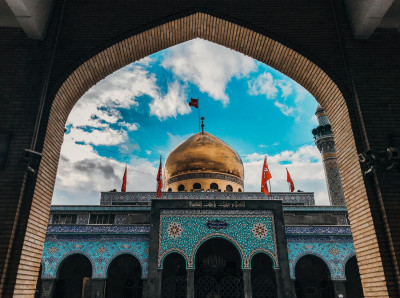Introduction Imam Ali ibn Abi Talib (peace be upon him) occupies a unique and central role in Islamic history. As the first divinely appointed Imam in Shia Islam, he is known for his unwavering devotion to God, his unmatched courage, deep knowledge, and embodiment of justice. He was the cousin and son-in-law of the Prophet Muhammad (peace be upon him and his family), raised in his household and chosen as his successor.
Lineage and Early Life
Imam Ali was the son of Abu Talib, the guardian and staunch supporter of the Prophet, and Fatima bint Asad, a noblewoman from the clan of Banu Hashim. He was born into the most honored family in Quraysh, known for their virtue, courage, and moral leadership.
He had several distinguished siblings, including Ja’far al-Tayyar, and was closely connected to the Prophet from his earliest years.
Miraculous Birth and Acceptance of Islam
Imam Ali was born on the 13th of Rajab inside the Kaaba, the most sacred site in Islam, a birth unparalleled in human history. This miraculous event signified his divine purity and unique position in the divine plan.
He was raised by the Prophet Muhammad (peace be upon him and his family) and became the first to embrace Islam from among the youth, never having bowed to any idol or lived in ignorance.
Marriage and Family
Imam Ali was married to Sayyida Fatima al-Zahra (peace be upon her), the beloved daughter of the Prophet. From this blessed union came Imam al-Hasan and Imam al-Husayn, the second and third Imams, as well as Zaynab al-Kubra and Umm Kulthum, who played pivotal roles in Islamic history.
He also had children from other righteous wives, including al-Abbas, known for his valor and loyalty in Karbala.
Titles and Honorifics
Imam Ali is known by numerous noble titles, including:
● Amir al-Mu’minin (Commander of the Faithful)
● Al-Murtada (The Chosen One)
● Al-Wasi (The Designated Successor)
● Haydar (The Lion)
● Bab Madinat al-‘Ilm (The Gate to the City of Knowledge)
These titles reflect his divine appointment, his spiritual authority, and his unparalleled nearness to the Prophet.
Virtues and Legacy
Imam Ali’s virtues are affirmed in countless authentic Shia narrations. He was:
● The only person born in the Kaaba
● The brother of the Prophet in a formal declaration of spiritual brotherhood
● The standard-bearer in every major battle of Islam
● Renowned for his wisdom, eloquence, and unmatched knowledge
His ring bore the inscription: “Allah is the King, and Ali is His servant.”
Divine Succession and Leadership
The Prophet Muhammad (peace be upon him and his family) publicly declared Imam Ali as his successor at Ghadir Khumm, saying:
"Whoever I am his master, Ali is his master."
This event, affirmed in countless Shia sources, marked the foundation of the Imamate.
Years later, Imam Ali assumed political leadership and made Kufa his capital. Despite facing multiple rebellions, he upheld justice, equity, and divine law in his governance.
Contributions and Teachings
Imam Ali’s sermons, letters, and wisdom were preserved in the renowned compilation Nahj al-Balagha (The Peak of Eloquence). This work continues to illuminate the path of ethical leadership, spirituality, and divine philosophy.
Martyrdom and Burial
On the 19th of Ramadan, 40 AH, Imam Ali was struck on the head by a poisoned sword while praying in the Mosque of Kufa. He attained martyrdom two days later, on the 21st of Ramadan.
His son Imam Hasan (peace be upon him) buried him in secret at Najaf al-Ashraf, a location that later became one of the holiest shrines in the Islamic world.




















اترك تعليق